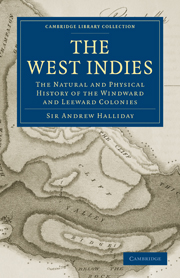Book contents
- Frontmatter
- Contents
- CHAPTER I
- CHAPTER II
- CHAPTER III
- CHAPTER IV
- CHAPTER V
- CHAPTER VI
- CHAPTER VI
- CHAPTER VII
- CHAPTER VIII
- CHAPTER IX
- CHAPTER X
- CHAPTER XI
- CHAPTER XII
- CHAPTER XIII
- CHAPTER XV
- CHAPTER XVI
- CHAPTER XVII
- CHAPTER XVIII
- CHAPTER XIX
- CHAPTER XX
- CHAPTER XXI
- CHAPTER XXII
- APPENDIX I
- APPENDIX II
- Plate section
- Frontmatter
- Contents
- CHAPTER I
- CHAPTER II
- CHAPTER III
- CHAPTER IV
- CHAPTER V
- CHAPTER VI
- CHAPTER VI
- CHAPTER VII
- CHAPTER VIII
- CHAPTER IX
- CHAPTER X
- CHAPTER XI
- CHAPTER XII
- CHAPTER XIII
- CHAPTER XV
- CHAPTER XVI
- CHAPTER XVII
- CHAPTER XVIII
- CHAPTER XIX
- CHAPTER XX
- CHAPTER XXI
- CHAPTER XXII
- APPENDIX I
- APPENDIX II
- Plate section
Summary
From the first settlement of Trinidad by the Spaniards in the sixteenth century, it continued under their dominion, without any interruption, till 1676, when a French fleet got possession, and kept it for a short time; but they found it not worth retaining, and very soon took their departure. For more than a century after that period, it must have retrograded rather than advanced in prosperity, as, fifty years ago, the whole of the colonial population, including white, brown, and black, freemen and slaves, did not exceed 700 persons; while the native Indians were more than 2000. About the last-mentioned date, however, a Spaniard from Grenada visited the island, and was so struck with its importance and capabilities, both as a colony and a commercial station, that he proceeded to Europe, and prevailed upon the court of Madrid to give it a share of their attention. Many of those impolitic restrictions which were peculiar to Spain, and calculated to impede all improvements in her foreign colonies, were, at the instance of Senhor St. Laurent, removed; and a royal edict was published, inviting all strangers, who professed the Roman Catholic faith, to settle in Trinidad, where they would meet with every possible encouragement, and be protected for five years against all duns and arrestment for debt, whatever might be the liabilities they had incurred in the places from whence they came.
- Type
- Chapter
- Information
- The West IndiesThe Natural and Physical History of the Windward and Leeward Colonies, pp. 296 - 312Publisher: Cambridge University PressPrint publication year: 2010First published in: 1837



